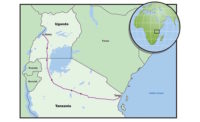Uganda has picked the Albertine Graben Refinery Consortium that includes U.S.-based conglomerate General Electric to build and operate a $4.3-billion oil refinery at Kabaale in the landlocked East African country’s Hoima district. France’s Total SA, UK’s Tullow Oil Plc and China’s CNOOC Ltd. Are developing a recently discovered crude oil reserve there, capable of producing an estimated 6.5 billion barrels per day.
Uganda said in a statement in early August the consortium that also includes Italy’s Saipem SpA and India’s Yaatra Ventures LLC “proposed to government a financing approach and a path to establish develop and operate a commercially viable refinery company with a strategic benefit to [Uganda] and the region.”
An earlier build-and-operate contract to Russia’s RT Global Resources fell through in July after the contractor pulled out of the deal. RT Global Resources did not issue official statement for its withdrawal. The contractor had edged out a group led by South Korea’s SK Engineering and Construction Co. after both made final offers in January 2015. RT Global Resources was to take up a 60% stake in the 60,000 barrels-a-day (bbd) refinery, while Uganda took the remaining 40% to share with neighbouring countries of Kenya, Tanzania, Rwanda and Burundi. Kenya announced an interest for a 2.5% stake at $54 million while Tanzania has confirmed taking up 8% for $150.4 million.
The preliminary agreement with the Albertine Graben Refinery Consortium, which edged out 40 other bidders, came soon after the May 26 signing of the $3.5-billion East African Crude Oil Pipeline Project by Uganda and Tanzania. The 1,445-kilometer-long crude oil export pipeline that is being designed by U.S.-based Gulf Interstate Engineering, linking Hoima in Uganda and Tanga port in Tanzania, will be completed in 2020. Timing is aimed to coincide with the start of crude oil production at the oil fields in the Albertine rift basin along the border with Democratic Republic of Congo.
Phase one of the refinery, to be financed by 70% debt and 30% equity, will process 30,000 bbd to be increased gradually to 60,000 bbd, according to Energy and Minerals Development Minister Irene Muloni.
Although Uganda said in August it expects to sign a build-and-operate contract with the preferred consortium in the next two months, the country’s media have reported that a Chinese consortium comprising Guangzhou DongSong Energy Group Ltd, Guangdong Silk Road Fund, China Africa Fund for Industrial Cooperation, China Petroleum Engineering and Construction Corp. and the East Design Institute has protested the award of the contract to the Italian-U.S.-Indian firms.
The Chinese consortium is reported to have denied claims that its bid for the project collapsed after Ugandan government's preferred bidder, China Petroleum Engineering & Construction Corp., dropped its bid for the lucrative contract. Neither of the Chinese firms nor the Ministry of Energy and Mineral Development responded to ENR’s request for comment.
Uganda’s President Yoweri Museveni sacked his permanent secretary for energy and mineral development Stephen Isabalija few days after the announcement of the Albertine Graben Refinery Consortium as the preferred bidder for the refinery project.
Museveni never gave reason for sacking Isabalija but government spokesman Ofwono Opondo said the President’s letter sacking the permanent secretary “is plain, [but] it doesn’t give reasons.”


Post a comment to this article
Report Abusive Comment